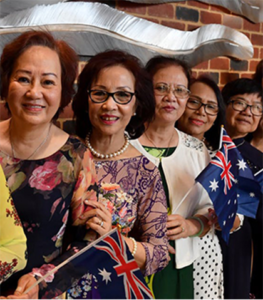Adapting to Australian culture important for migrants – study finds
Migrants who adapt to Australian culture are happier and do better than those who don’t, according to new research.
 A study that looked at factors influencing personal wellbeing among skilled migrants found that more time spent in Australia doesn’t necessarily lead to more personal well-being if skilled migrants don’t adapt to Australian culture.
A study that looked at factors influencing personal wellbeing among skilled migrants found that more time spent in Australia doesn’t necessarily lead to more personal well-being if skilled migrants don’t adapt to Australian culture.
Swinburne University of Technology researcher Dr Asanka Gunasekara used the Australian Unity Personal Wellbeing Index (PWI), which measures the level of a person’s satisfaction using a points system from 0 to 100, to assess the wellbeing of a sample of skilled migrants.
“In a multicultural country like Australia, it’s easy for migrants to keep their heritage culture alive. But our recent research that surveyed more than 300 migrants found those who adapt to Australian society, called ‘Australian acculturation’, have greater personal well-being than those who don’t,” Dr Gunasekara said.
“We looked at the relationships between time in the host country, acculturation and personal well-being among non-Western skilled migrants in Australia. We found that migrants who reported having a higher personal well-being also had: acculturated more to the Australian culture than to their heritage culture; higher English language competency, and; an Australian identity,” she said.
But interestingly, the group of skilled migrants surveyed appeared to be happier than the average Australian.
The study found the average PWI of the Australian general population ranges from 74.2 to 76.8 out of 100, whereas the average PWI of our skilled migrant sample is higher, at 77.27.
Dr Gunasekara said it was possible the higher education, skills and salaries of the skilled migrants in the survey may have contributed to higher levels of personal well-being, compared to the Australian population as a whole.
But she said skilled migrants recorded the lowest score for the ‘community connectedness’ factor, along with the rest of the Australian population. Community connectedness refers to the number and strength of connections a person has with others in their community.
Dr Gunasekara said ‘community connectedness’ may be lower because: skilled migrants maintain close contact with ethnic and extended families; there are few opportunities for them to be involved in the wider Australian community, or’ they feel excluded from the wider community.
“Rather than acculturation, some skilled migrants will maintain their own culture, and add layers of cultural practices from their host country. For them, ‘biculturalism’ – or being able to switch between host and heritage cultures – is more realistic,” she said.
“For example, an Indian family who moved to Melbourne will keep their culture alive through food, language and friendship circles, but might also go to the footy and support an AFL team,” Dr Gunasekara said.
“Full acculturation, on the other hand, is when migrants abandon their heritage cultural practices and values when they adapt to the host culture.
“For a first generation non-Western migrant, adapting to the Australian culture is even harder. Research has shown that acculturation into a Western country is unlikely for these people.
“This is for a number of reasons, such as pride in their heritage culture, maintaining strong connections with relatives and friends, and the societies they move to allow them to maintain heritage cultural practices through multicultural policies,” Dr Gunasekara said.
She said that while most people migrated when they were young, Australian acculturation was important to help combat social isolation as people aged, citing a study which found older people from culturally and linguistically diverse backgrounds are at a greater risk of depression than Anglo-Australians.












